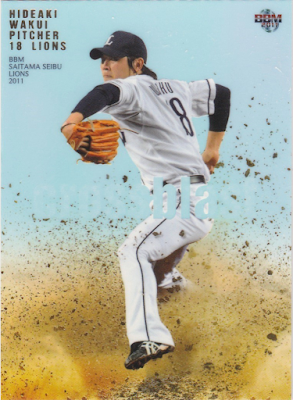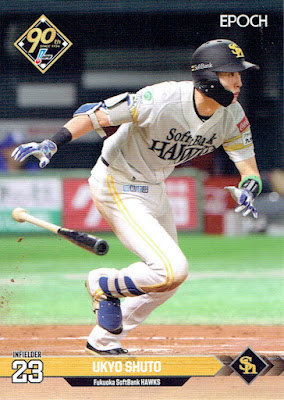2024 marks the 15th straight year that BBM has done some sort of "cross" subset - usually distributed across multiple sets - and the tenth year that it's pretty much been in its current form. I thought I'd devote a post to what I guess is now a staple of BBM's flagship sets although I personally think it's high time for them to come up with a new gimmick.
So what's the "cross" subset? It's a subset that BBM has issued that is included in multiple sets each year (with one exception) that's called "Cross Something" (again with one exception). The cards show images of players superimposed on some common background - one that usually has some relationship to the name of the subset. The subset is numbered separately from the sets that the cards appear in although the cards are labelled for the sets that they are with. I'm sure this sounds a bit confusing but hopefully it'll make sense as I go through the subsets over the years.
BBM introduced the first "cross" subset in 2010 as part of their 20th Anniversary. The "Cross Stream" subset was the largest and most complicated instance of this idea. It totaled 180 cards across 15(!) different sets. There were 36 cards in the 1st Version set (three per team), 36 cards in the 2nd Version set (again three per team) and 36 cards in the Touch The Game set (and I probably don't need to say three per team but I will still). Each of the twelve individual team sets also had six "Cross Stream" cards for that particular team which meant that each team was represented by 15 total cards in the subset.
What was kind of crazy about the subset was the numbering. All the cards were grouped by team with the Giants cards being the first 15, the Dragons being the next 15, etc. Which meant that the cards that appeared in 1st Version were numbered CS001, CS002, CS003, CS016, CS017, CS018, CS031, CS032, CS033, etc. Similarly, the 2nd Version cards were numbered CS004, CS005, CS006, CS019, CS020, CS021, CS034, CS035, C036, etc. The Touch The Game subset was numbered CS007, CS008, CS009...well, you get the idea. For the 15 cards for each team, the first three cards were in 1st Version, the next three cards were in 2nd Version, the next three were in Touch The Game and the last six were with the team set. I believe that all these cards were considered part of the base set that they appeared it. UPDATE - according to the comment below from Kevin, the last three cards for each team were for former players for that team that were on the team's coaching staff in 2010, including possibly the manager.
Here's the front and back of one of the cards - the backs resemble the design of the 1991 BBM cards:
 |
| 2010 BBM 1st Version #CS002 |
You'll notice that it's the same photo on the back of the card as the front but the one on the back has the full background. As we'll see, that's going to be the standard for these cards going forward.
BBM went from the largest "cross" set in 2010 to one of the smallest in 2011. There were only 36 "Cross Blast" cards issued and they're extremely rare. There were three of them issued with each of the twelve team sets and they appear to have been a essentially a short printed parallel version of an insert card from the set. Again, this may sound kind of confusing so let me give an example. The 2011 BBM Lions set had a nine card insert set called "Invincible Lions". Three of those cards - LS3 (Hideaki Wakui), LS5 (Hiroyuki Nakajima) and LS9 (Takumi Kuriyama) - have "Cross Blast" versions that are apparently /50. I don't have any of these cards and I haven't seen images of the backs so I don't know if they have a "Cross Blast" card number that's separate from the numbering from the insert set. (I'm using the BBM checklists from Sports Card Magazine #116 to figure most of this out.)
As I said, I don't have any of these cards but I did find some images on line. Here's Wakui's card:
Things got a little simpler in 2012. BBM dropped the size of the "Cross Blaze" subset to 108 cards across only three sets - 1st Version, 2nd Version and Genesis (which replaced Touch The Game that year). Each set had 36 cards from the subset in it. Each team was represented with nine cards in the subset. The subset cards in each set were skip numbered in a similar fashion to those in 2010 so the cards in 1st Version were numbered CB001, CB002, CB003, CB010, CB011, CB012, CB019, CB020, CB021, etc; those in 2nd Version were numbered CB004, CB005, CB006, CB013, CB014, CB015, CB022, CB023, CB024 and the Genesis cards were CB007, CB008, CB009, CB016...and again, you get the idea. Here's the front and back of one of these cards:
 |
| 2012 BBM 1st Version #CB037 |
The text at the bottom of the photo on the back of the card says that the photo was taken in 2011. I'm not sure why BBM felt the need to mention this. None of the other cards in the subset that I have (I don't have the Genesis ones) have this.
2013 was pretty much a carbon copy of 2012, at least in terms of the size of the subset and which sets it was in. There were 108 "Cross Wind" cards split evenly across the 1st Version, 2nd Version and Genesis sets. They had the same numbering that the "Cross Blaze" cards had (which I'll skip listing out again). Here's a sample:
 |
| 2013 BBM 2nd Version #CW058 |
Jason Presley pointed out to me once that the first four instances of these subsets corresponded to the four "classical elements" - water, earth, fire and air.
BBM didn't put a "cross" subset in their sets in 2014. Instead, they issued a 36 card "Cosmic Cross" subset in issues of Sports Card Magazine that year. Each of the six issues of SCM that year included six cards from the subset (as well as six other cards). As you'd expect, there were three cards for each team in the set. Here's an example:
 |
| 2014 BBM Cosmic Cross #SCM25/SCM #288 |
BBM brought the "cross" subset back to their flagship sets in 2015. There would be 36 "Cross Plasma" cards in each of the 1st and 2nd Version sets that year. In addition, there were 12 bonus cards for the subset included in SCM #110 which was issued in late March of 2015. The bonus cards meant that the total number of subset cards was 84 which worked out to seven cards per team. BBM changed the card numbering so that the subset in each set was no longer skip numbered. The 1st Version cards were numbered CP01 to CP036, the 12 bonus cards were numbered CP37 to CP48 and the 2nd Version cards were numbered CP49 to CP84. Here's examples of both a 1st Version card and one of the SCM cards:
 |
| 2015 BBM 1st Version #CP28 |
 |
| 2015 Cross Plasma #CP37/SCM #308 |
BBM has pretty much stabilized the "cross" subset ever since 2015 - minus the Sports Card Magazine bonus cards (since they stopped publishing SCM in 2017). There have been 72 total cards split evenly between the 1st and 2nd Version sets for a total of six cards per team. The checklists are no longer skip numbered so cards 1-36 are in 1st Version and 37-72 are in 2nd Version. Here are examples from each year from 2016 to 2024:
 |
| 2016 BBM 1st Version #CF27 |
 |
| 2017 BBM 2nd Version #CS63 |
 |
| 2018 BBM 1st Version #CU11 |
 |
| 2019 BBM 2nd Version #CS59 |
 |
| 2020 BBM 2nd Version #CB64 |
 |
| 2021 BBM 1st Version #CT16 |
 |
| 2022 BBM 1st Version #CG22 |
 |
| 2023 BBM 1st Version #CM07 |
 |
| 2024 BBM 1st Version #CE26 |
Some random comments:
- I had been under the impression in 2010 that some of the players in the subset were OB players but I haven't seen any evidence that that's actually the case. I think all the players in the "Cross Stream" subset were active players. To my knowledge, the only OB players in any of the subsets were Kazuo Matsui and Takahiro Arai in the 2023 "Cross Moon" subset - both were rookie managers that year. UPDATE - this is not correct. As I updated above, according to the comment below from Kevin, the last three "Cross Stream" cards for each team were former players on that team's coaching staff at the time.
- I haven't checked this exhaustively but I believe that Hayato Sakamoto is the only player to appear in all 15 "cross" subsets (including "Cross Blast").
- Shohei Ohtani appears in the "cross" subset for each of the five years he played in Japan - 2013-17.
- I think there have been numbered parallel versions of all the subset cards with the exception of the "Cross Blast" cards, the "Cosmic Cross" cards and the SCM bonus "Cross Plasma" cards but I don't know all the details.
Each year, BBM has issued insert and/or autographed cards that are related to that year's "cross" subset - even in sets that the "cross" subset doesn't appear in. I have two examples of these:
 |
| 2018 BBM Giants "Cross Foil Signing" #CFS12 |
 |
| 2020 BBM 1st Version "Cross Signing" |
Both of these cards are serially numbered but, surprisingly, the foil signature card has a smaller print run that the autographed card - /15 as opposed to /30.
I fully expect BBM to continue to do these "cross" subsets each year, but, as I mentioned at the start of this post, I'd be just as happy if they did something new next year.























































